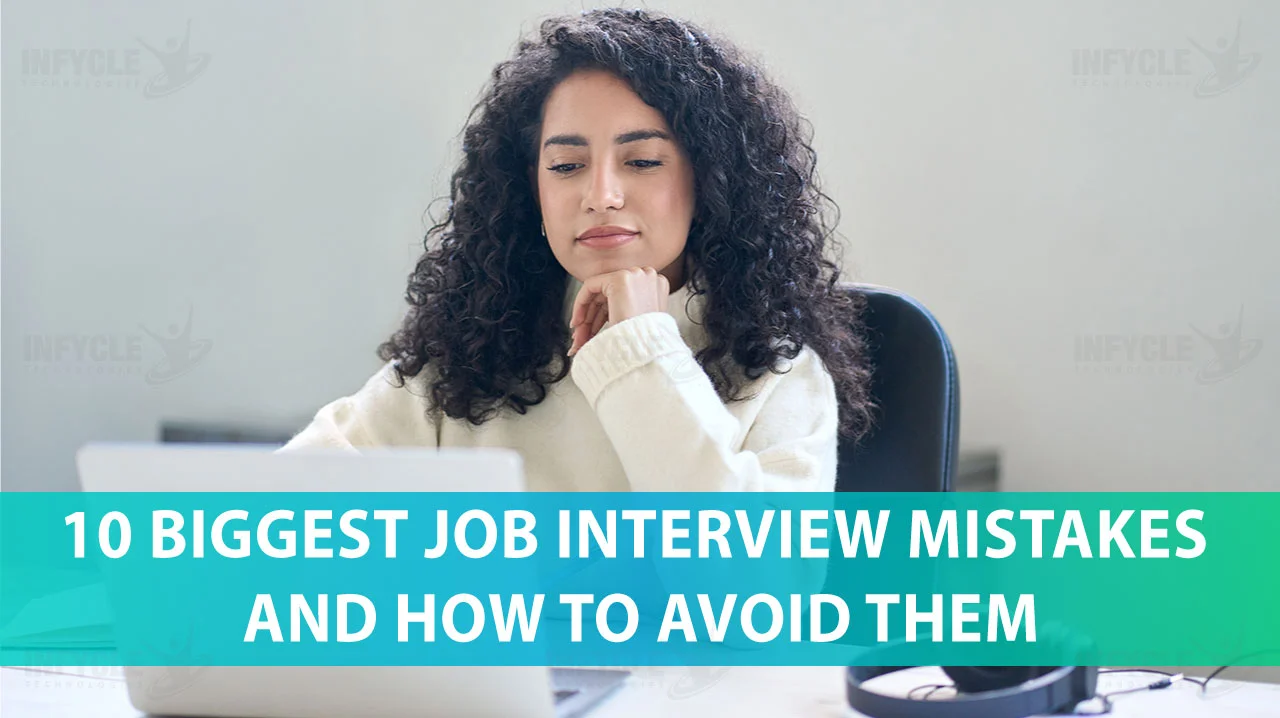10 Biggest Job Interview Mistakes And How To Avoid Them
A job interview mistakes is a process in which a potential employer evaluates a job seeker’s qualifications, skills, and experience to determine. If they are a good fit for a particular position. A successful job interview depends on the candidate’s ability to demonstrate their qualifications, communicate effectively, and make a positive impression on the interviewer.
Job interviews can be nerve-wracking experiences. Especially if you’re hoping to secure a new job or advancement in your current position. With so much at stake, it’s understandable to be anxious and make mistakes. But it’s important to be aware of the most common ones so that you can avoid them.
In this blog, we’ll take a look at the 10 biggest job interview mistakes and how you can avoid them.
Being Unprepared
It’s essential to prepare for an interview. If you want to show up with confidence and feel prepared to answer the interviewer’s questions. Learn about the history, positioning, and competitors of the company, as well as get to know its relevant stakeholders. Ensure that you are completely aware of the responsibilities and requirements of the job you are applying for. By doing so, you will be able to tailor your responses to particular job requirements.
Be well-prepared for some of the most common interview questions, such as “Tell me about yourself,” “Why do you want to work for this company,” and “What are your strengths and weaknesses?” By doing so, you can ensure that you’re well-prepared for your interview and ready to make the best impression possible.
Being Late
Arriving up too late for an interview process will not go over well with a company or hiring manager. Unless you have an urgency or very good cause for arriving late and have contacted ahead to inform or reschedule.
Think ahead while making travel plans for the day — does the train route occasionally face delays? It can be worthwhile to board one or two trains earlier than you originally intended to do so that you have ample time to get there and concentrate on your last-minute preparations while you wait. You can also set an alarm to alert you when it’s time to leave for the interview. The night before your interview, prepare your outfit and gather all required documents or materials.
Alternately, in the era of online interviews for jobs, make sure to check your technology and the software that will be employed to conduct the session. So that you can avoid being late because you were unaware that the platform needs to be downloaded and launched beforehand.
Dressing Inappropriately
Dressing inappropriately for a job interview is wearing attire that is not appropriate or professional. In a job interview mistake, it is critical to make a good first impression, and how you dress can play a huge role in this. Employers frequently analyze a candidate’s appearance to judge their professionalism and attention to detail, thus dressing inappropriately might have a negative impact on their opinion of you.
Choosing your outfit wisely will help you show yourself professionally. Clothing needs to be spotless and recently ironed. Arriving in a pair of torn jeans and athletic shoes hardly conveys a professional look.
The kind of company you’ve gone to should be able to tell you what to wear. For instance, corporate or legal organizations usually have a more professional dress code, whereas IT or creative firms tend to have a casual one. But always rely on the side of caution when in doubt. Going with formal is preferable to underdressing.
Speaking Negatively About Former Employers Or Colleagues
Speaking badly about former employers or colleagues is generally regarded as unprofessional and can affect your professional reputation. This type of behavior can also cast a negative light on your character and integrity, as well as your ability to collaborate with others and establish strong connections.
Your chances of being successful are likely to be reduced if you criticize your coworkers, point out the drawbacks of your present or former employees, or complain about your employers. Employers are left with a bad impression of you and wonder what you would say about them in a similar situation. Always be diplomatic, regardless of why you left your present or former job. Potential employers shouldn’t perceive you as unfaithful.
Hence it’s always ideal to maintain a professional and respectful approach when interacting with people, including when discussing past job experiences. This can assist you in maintaining a positive reputation and developing solid ties in your career.
Being Too Formal Or Too Casual
In a job interview mistakes, it is critical to find the right balance between being too professional and too casual. Being too formal might make you appear stiff, rigid, and uninterested in your profession and company. Being too casual, on the other hand, may show a lack of professionalism and create the impression that you are not taking the interview seriously.
Present yourself as assured, knowledgeable, and competent to strike the right balance. This entails presenting yourself professionally, using appropriate language and nonverbal cues, and showing the interviewer politeness and respect.
On the other hand, it’s important to show that you have individuality and fit in with the corporate culture. It can be beneficial to learn more about the firm, share relevant experiences, and show genuine interest in the position and the firm.
In essence, getting the right impression and proving your suitability for the job depends on finding the ideal balance between appearing too professional and too casual during a job interview.

Failing To Ask Questions
During a job interview, failing to ask questions can be a missed opportunity to express your interest in the role and the company. Failing to ask questions can indicate a lack of engagement, preparation, or real interest.
Asking questions is an essential element of the hiring process. It can help you determine whether the position is a good fit for you by informing you about the role, the organization, as well as your colleagues. Furthermore, asking questions demonstrates that you have carried out prior research and are eager to find out more about the firm.
Some common job interview questions include:
- Can you tell me about the company culture?
- Can you lead me through the next steps in the hiring process?
- What are the prospects for progression and growth within the company?
To ensure that you don’t neglect to ask, it doesn’t harm to write these questions out just to bring with you to the interview. By demonstrating greater interest through your questions, you’ll make a terrific first impression. Likewise, the responses might make it clearer to you what the job entails and whether you’re the suitable person for it. So don’t miss out on this chance.
Talking Too Much Or Not Enough
It’s important to strike the right balance during a job interview mistakes between talking too much and not talking enough. Talking excessively during an interview may overwhelm the interviewer and lessen the impact of your responses. On the other hand, speaking too little can reveal a lack of assurance, enthusiasm, or professionalism.
To strike the right balance, pay attention to the interviewer’s questions and provide short, appropriate responses. However, it’s as important to actively participate in the conversation and offer your own opinions. Ask meaningful questions and back up your responses with relevant examples. And experiences to show that you are interested in the position and the company.
Thus striking the right balance between talking too much and not talking at all can leave a positive impression. And show that you are qualified for the position by being assured, informed, and interested.
Not Paying Attention To Nonverbal Cues
During job interviews, it’s a big mistake to ignore nonverbal cues because they could negatively impact your performance. Nonverbal cues are various forms of body language and gestures that individuals employ to communicate without using words. Cues include things like eye contact, facial expressions, posture, gestures, and tone of speech.
In an interview, nonverbal cues can convey your assurance, engagement, and passion for the position. You run the danger of coming off as indifferent, uneasy, or even unreliable if you choose to ignore these cues. Even if you are prepared and provide the right responses to their questions, the interviewer may have a bad impression of your skills and qualifications as a result.
Being aware of both your own and the interviewer’s nonverbal cues is essential during a job interview. Maintaining eye contact may communicate your interest and involvement and leaning forward can show that you are paying attention to and involved in what the interviewer is saying. In contrast, avoiding eye contact, fidgeting, or crossing your arms can show defensiveness, unease, or disinterest.
Failing To Follow Up
After a job interview, job seekers may suffer if they don’t follow up. It could show the employer’s disinterest, lack of competence, or poor communication abilities. It is customary to send the interviewer a thank-you note within 24 to 48 hours of the interview. This shows gratitude for their time and reaffirms the applicant’s interest in the position.
The candidate should follow up after a few days or a week. If the employer hasn’t given a deadline for making a hiring decision. This follow-up might come in the form of an email or a phone call. And it can be used to reaffirm your interest in the position as well as to find out how the hiring process is going.
Being Unprepared To Discuss Salary
Being unprepared to discuss salary during a job interview mistakes can affect a candidate’s chances of landing the job. It is typical for an employer to inquire about a candidate’s pay expectations or requirements during a job interview. It is recommended that job seekers conduct preliminary research on the industry and the specific firm in order to gain a better grasp of the average salary range for the position they are applying for.
When discussing salary during an interview, job seekers should be confident and transparent. They should declare their salary expectations explicitly and be prepared to justify them if necessary.
How Can Infycle Help In Avoiding These Mistakes In Job Interviews?
By offering mock interviews, courses on resume-building, and career assistance, Infycle can assist students in avoiding common job interview mistakes. Students can use these tools to communicate more effectively, highlight their relevant experiences and skills, and learn what companies want from job prospects.
Final Thoughts
Making a good first impression on prospective employers requires avoiding these 10 common interview mistakes. Job seekers can improve their prospects of finding employment and smoothly transitioning into their next position by being aware of these frequent blunders and taking action to avoid them.





